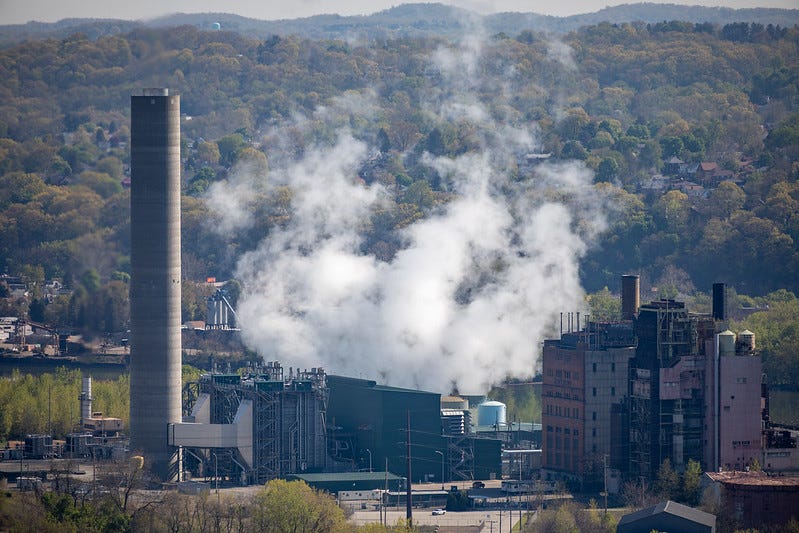Dimon's divestment line; plus ESG plays in China with AvantFaire's Catherine Chen
Welcome to Callaway Climate Insights. Today we're introducing a 30-day free trial for potential subscribers. Please try it out, and share.

As CEO investor letters go, the rule of thumb is that the bigger annual events they become, the less newsworthy they are. Such was the case this year with Warren Buffett’s letter, Larry Fink’s from BlackRock (BLK), and Jamie Dimon’s from JPMorgan Chase (JPM), which dropped today.
Coming in at a robust 66 pages (compared to Buffett’s 14 and Fink’s 20-something), Dimon’s letter exhaustively expostulated on the problems facing banking from issues like Covid and China, but mostly from Washington D.C. Two pages (19 and 20) were dedicated to JPMorgan’s sustainable efforts, and in them, Dimon drew a firm line against divestment of fossil fuel clients.
“Traditional energy resources play an essential role in our global economy today,” he wrote. “We can agree on the need to make our energy system much less carbon intensive. But abandoning companies that produce and consume these fuels is not a solution. Furthermore, it’s economically counterproductive. Instead, we must work with them.”
Dimon, who was a few years ahead of me at our high school in New York City in the late ‘70s, is only being realistic. Both the European Union and the U.S. have stopped short of divestment rhetoric in their climate policies and have made it clear that both fossil fuels and nuclear will be part of the solution. Indeed, with global energy demands soaring, not just for poorer nations but for new technologies to help lower emissions, working with established energy providers is the only way forward, however unpalatable it might be.
What concerns us, though, is the inevitable stalling of real progress that these statements engender. Rather than a list of grievances, we would rather see hard evidence in these letters that working with Big Oil is succeeding. And fast. For on the flip side, the Mauna Loa Observatories on Hawaii’s Big Island recorded for the first time over this past weekend a CO₂ reading of 420 parts per million, or roughly halfway to double what it was in pre-industrial times.
Perhaps these letters should be quarterly.
More insights below. . . .
Don’t forget to contact me directly if you have suggestions or ideas at dcallaway@callawayclimateinsights.com.
ZEUS: Impact investing in China with AvantFaire’s Catherine Chen
SAN FRANCISCO (Callaway Climate Insights) — Catherine Chen smiles when asked why her Hong Kong-based investment fund with a focus on impact investing in China has a French name.
The founder of AvantFaire Investment Management Ltd., whose family comes from Tianjin but who attended universities in Toronto and London, speaks nine languages and got her early environmental, social and governance (ESG) experience at Royal Bank of Canada, said the term is a reference to the nascent nature of sustainable investing. In English, it means “before doing.”
“We wanted to be pioneers in impact investing,” Chen said in a Zoom interview from Tianjin, where she was visiting family last week. “In 2020, we saw strong growth in ESG investing around the world and we expect this trend will continue to be strong under any market conditions.”
What’s interesting about Chen is not just her youthful exuberance, yet veteran’s knowledge of ESG investing, but her concepts about how to break down investing in China in the wake of the government’s 14th five-year plan this spring. . .
To read the full column, click here to try a 30-day free trial subscription to Callaway Climate Insights with this limited-time special offer.
Wednesday’s insights: Record EV sales, hospital pollution and tailpipes in California

. . . . Speaking of China, two popular electric vehicle companies with stock listings in the U.S. both reported record deliveries in March. Nio (NIO) and Xpeng (XPEV) both saw deliveries rise almost five-fold. While still dwarfed by Tesla (TSLA), the deliveries are a leading indicator for electric vehicles in the world’s largest auto market. Investors, however, have other players in their sights. Read more here. . . .
. . . . The Biden administration is planning to tighten auto-emissions rules nationwide in July, and all eyes are on California to see if the national standards will meet — or exceed — its current tight regulations of 54.5 miles per gallon by 2025. Anything less will likely be seen as a sop to the auto industry, even though it is quickly moving into the hybrid and electric markets itself. Read more here. . . .
. . . . Among the many devastating effects from Covid has been the rise in pollution from overwhelmed hospitals and healthcare facilities, with one report estimating the global impact as the equivalent in carbon output as that of more than 500 coal plants. The need to bring sustainability practices to healthcare, not only for emissions reduction but for cost concerns as Covid continues to rage, has never been greater. Read more here. . . .
Data driven: Natural gas rises

. . . . The latest report on natural gas production from the U.S. Energy Information Administration shows a ninth straight month of year-over-year decline. January 2021 saw a 2.4% decrease in natural gas production compared to January 2020, with California (23.1% production drop), Oklahoma (15.1% production drop) and Wyoming (12.9% production drop) experiencing the largest state dips in natural gas production. West Virginia, a major coal state, bucked the national trend with a 12.2% increase year-over-year in natural gas production in January. — George Barker.
News briefs: Green Easter, green win for Greenland, more
Editor’s picks:
Britain sees record 80% renewable usage over Easter weekend
Greenland’s opposition wins election, hurting mining interests
Canada’s pension board creates new sustainable energy group




